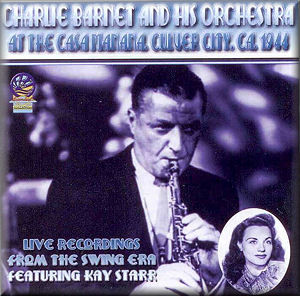Casa Manana, Culver City, CA, 28 May, 1944
1. Introduction
2. Johnny Come Lately
3. I'll Be Seeing You
4. Oh! Miss Jaxson
5. Sentimental Lady
6. Little John Ordinary
7. Star Eyes
8. Washington Whirligig
9. It's Love, Love, Love
10. In a Mellotone
Casa Manana, Culver City, CA, 2 June, 1944
11. Introduction
12. Skyliner
13. Long Ago and Far Away
14. Keep the Home Fires Burning
15. Haunted Town
16. I Like to Riff
17. Johnny Come Lately
18. Going My Way
19. Washington Whirligig
20. Cottontail
21. Little John Ordinary
Peanuts Holland - Trumpet, vocals
Al Killian, Wes Hensel, Lyman Vunk - Trumpets
Porky Cohen, Tommy Pedersen, Ed Fromm - Trombones
Charlie Barnet - Soprano sax, alto sax, tenor sax, arranger
Kurt Bloom, Andy Pino - Tenor saxes
Bob Poland - Bass sax
Dodo Marmarosa - Piano
Barney Kessel - Guitar
Howard Rumsey - Bass
Harold Hahn - Drums
Kay Starr - Vocals (tracks 3, 7, 9, 13, 15, 18)
Bud Estes, Andy Gibson, Horace Henderson, Billy Moore, George Siravo - Arrangers
During the big-band era, Charlie Barnet's bands did not enjoy quite the acclaim or "stardom" of others, such as the Goodman or the Dorsey or the Miller aggregations; yet they were not without their "hits", such as Cherokee and Skyliner. In terms of popularity, Barnet's bands may have been among the lesser lights, but he was not one of the lesser bandleaders of that time. His bands reached their peak ascendancy during the first two years of the 40s' decade and were virtually gone by the end of that period, Barnet finally breaking up his last band in 1949, although once in a while after that he would put one together for the odd occasion, the last being in 1966. His bands were all swinging outfits, Barnet not being much interested in establishing commercial appeal. He didn't have to, as he was one of the few musician/bandleaders of the time to have been born with a silver spoon in his mouth, only later to be replaced with a reeds mouthpiece. He was not financially dependent on a paycheck so could go for what he wanted, which was a loose, swinging feel and sound like that of the black bands which he admired.
Among Barnet's heroes were Duke Ellington and Count Basie. The former is represented on this recording, a pair of concert broadcasts for the Armed Forces Radio Service series of "One Night Stands", by two tunes: In a Mellotone and Cottontail. Unfortunately, In a Mellotone is a broadcast closer, so we only get a little over a minute. However, Barnet made no attempt to simply copy the Ellington styling-he had his own arrangement to work from, although there was some influence, his arrangers having started from the Ellington interpretation. Indeed, one of them, Andy Gibson, had been an arranger for Ellington for a short time in 1937.
Barnet's Cottontail is another case in point Ellington recorded it at varying tempos, from breakneck to sedate, and Barnet chose one toward the faster end of the spectrum. But Ellington buffs would not be fooled into thinking that Barnet's track was played by Ellington-Barnet had no desire to create a pastiche.
The featured vocalist with the band, Kay Starr, was 22 years old at this time. She had been hired toward the end of 1943 by Barnet as a replacement for Lena Horne. However, she had to leave the band in 1945 after contracting pneumonia. On recovering, she found she had lost her voice and, in an attempt to recover, stopped singing and even speaking for six months. When she resumed her singing (not, however, with Barnet), her voice had deepened and gained a huskier timbre, so her voice on this recording differs from that at the height of her career, not just because of her youth but also the medical situation just mentioned. But the vibrato and slight nasal quality we hear here were retained throughout her career. None of the songs she sings on this disc were reputation-setters for her, but they would have appealed to listeners of that wartime era, particularly I'll Be Seeing You, Long Ago and Far Away, and Keep the Home Fires Burning.
Barnet was not interested in playing dance music, as is quite apparent from these renditions on this disc. Some of the numbers, especially the slower ones such as I'll Be Seeing You or Sentimental Lady or Star Eyes, are danceable, but it is hard to imagine people taking the floor for Skyliner or Washington Whirligig or Johnny Come Lately. With its strange harmonies, almost discordant at times, Johnny Come Lately foreshadows the coming bop period, and the announcer and the audience appear to have been taken by surprise by its "sudden" ending.
Two tunes almost universally associated with the Charlie Barnet band, perhaps, are Cherokee and Skyliner, but only the latter is represented here. The arrangement is, as far as I can tell, identical to that of the one recorded in the studio, with its crisp brass which executes the beautiful ascending bell-like runs. Barnet would surely not object to Skyliner's bringing to mind his band whenever that title is mentioned.
Barnet fans, big band fans, and forties radio fans will want this CD.
Bert Thompson
